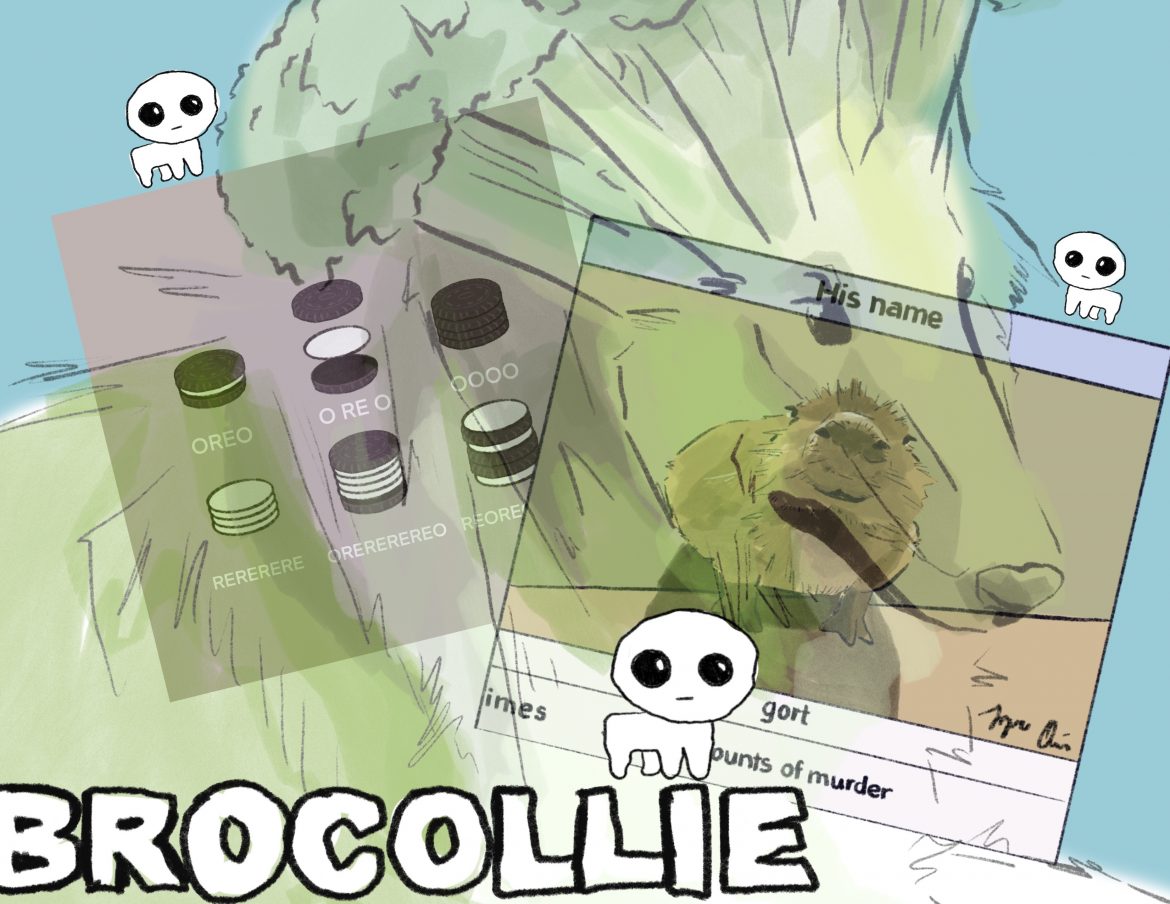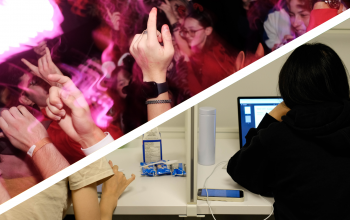Illustration Credit: Joyce Qiu, Illustration Editor
A look into the complexity of online meme culture
Kaitlin Wilson, Associate Features Editor
If you’re reading this article as a student or young adult no older than about 23, then congratulations: you can be grouped as a member of Generation Z. Known by older generations for being addicted to our phones, overly dramatic about mental health, and too sensitive, it seems there is little we can do to avoid these harsh opinions. But hey, at least we don’t have bad trends like millenials and their skinny jeans (sorry).
I myself am not alien to the stereotypes that come along with being young and a “Zoomer.” I think most of us can relate to the comments from those in older generations about how we’re “always glued to that phone” or “listening to that garbage music” and yearly comments at holiday gatherings about how our jeans have holes in them (from my personal experience the last example is usually specific to grandparents).
I am constantly reminded of generational differences when I find myself laughing at a meme around my parents. I’m sure many people can relate: there have been times that I am laughing about something on my phone and my parents shoot me a curious glance. Determined to be the “cool parents,” they’ll sometimes ask what could possibly be so funny, to which I sometimes show them my phone, but most of the time I end up saying, “it’s okay, you wouldn’t get it.” But showing what made me laugh to my sister would most likely make her laugh as well. So why don’t those in other generations understand Gen Z humour? Why is it so complex, and what makes it different?
Layers of Irony
A lot of the humour found online is layered with some form of irony. Creator OliSUNvia goes over the various forms of irony and how they are used in her YouTube video titled “what makes gen z humor so interesting?” (If this topic is interesting to you, like it is to me, I totally recommend checking it out.) She starts by explaining how irony in humour hides the real meaning of the joke with a statement of the opposite. Where Gen Z humour really gets interesting is when simple forms of irony become layered on top of each other, which is called meta-irony. The real message of the statement is mixed in with the irony, so it becomes unclear if the act is meant to be ironic or sincere.
Take one of those minion memes, for example, the ones with quotes such as, “exercise, I thought you said extra fries!” They’re not actually funny to Gen Z in a sincere way. It’s the irony in the fact that Boomers think the joke is funny, that is funny to the Zoomers.
Humour as a Coping Mechanism
Why is it that some of the most relatable and popular posts are about things usually regarded as the opposite of funny? Jokes about declining mental health, climate change, the supposed meaningless of life, and existential crises (just to name a few) are not unfamiliar to Gen Z. OliSUNvia describes the driving force behind this nihilistic humour as a feeling of hopelessness and defeat of the world we live in.
OliSUNvia further describes how the internet responds to rather serious global situations with humour as a way to cope with constant exposure to bad news. For example, when US President Trump ordered the assasination of Iranian general Qassem Soleimani back in January 2020, the internet’s response was — of course — World War 3 memes. I remember this trend as posts joking about being drafted into war, and how idiotic our generation would be when “fighting in the trenches.” But why does Gen Z resort to humour when faced with the most serious news and threats?
It certainly doesn’t help that having fast access to the internet and social media means we are constantly updated by news outlets who seem only to report on the most dire global situations. I, for one, like to frequent the Apple News app to stay in the loop and occasionally scroll through the trending and science sections. I often find myself discouraged by the news: just this week headlines like “concerns over water quality linger in B.C. community” and “Freeland warns of ‘difficult days ahead’ as Canada’s economy shows signs of weakness” were some of the few on my app.
Finding laughter in the midst of a burning world is a way for Gen Z to cope with the burden of being constantly connected to the world’s worst news. Bonding over the universal feelings of anxiety and fear for the future allows Gen Z to share the burden of living in a world where global disappointments are more apparent than ever.
We Live in a (Meme) Society
One major generational difference between Zoomers and Millennials is the fact that we have grown up with the internet. OliSUNvia describes how millennials have a sense of self outside of their online personas, because they grew up apart from, and later had to adapt to, the internet. Us Zoomers grew up with the internet; most of us remember watching Smosh and Minecraft let’s plays on YouTube, taking bad Buzzfeed quizzes online and posting photos on Instagram before the app was updated and redesigned.
For most of Gen Z, who we are online and what content we interact with has become a part of who we are and our identities. Our online personas extend into the real world and we use internet references and memes to connect with people. One meme, joke, or song will go viral, and somehow all your friends in person know exactly what you’re referencing without having to share it yourself. This applies to both newer memes and older, more iconic references. Most young adults cringe at a classic “Rick Roll,” or make iconic Vine references even though the app has been dead for years. Memes have been a way to unite the younger generation, and have become so important that they often will make impacts on society at large.
One of my favourite examples of this occurred after the release of the “hit” movie Morbius. From what I’ve heard, this movie was pretty bad, and this must be true since it was given only 15% on Rotten Tomatoes. Because it was so poorly received, people started making up situations that could have made the unfortunate motion picture better. Thus, the phrase “it’s morbin’ time” was born. This hilarious fictional catchphrase flooded the internet, and jokes about Morbius and “it’s morbin’ time” trended on Twitter for an entire week. After a horrible box office performance, the movie was re-released to over a thousand theatres only because of the popularity of a line not even featured in the script.
Absurdity
Another common feature of a lot of popular Gen Z memes is a level of absurdity. You know the classic characteristics of all the best memes circulating the internet: distorted, bass boosted, two-time speed, warped, and cut-off videos. There’s a certain comedic effect to so-called android quality videos: those that are low in both video and audio quality. Additions like the Vine boom, bruh sound effect number 2, “nuh-uh” (in a squeaky voice), and that cartoon running noise complete the experience of watching “crunchy” memes online. Gen Z seems to interact the most with absurd and random content, because of the desire to be different and unpredictable.
A level of unexpectedness brings humour for our generation — the more absurd and surprising the outcome, the funnier the post is and the more likely someone is to share it with a friend. What makes that random oak tree that has been showing up on my feed so unique is the fact that it is so random. It’s funny because of the situations that people post it under.
It’s All One Big Inside Joke
The consequence for the majority of Gen Z humour being spread online is that a lot of memes end up as global inside jokes. There is an accelerated cycle of trending jokes, and more often than not these jokes reference other popular or older meme formats. Once everyone sees a meme, it becomes old and irrelevant as newer jokes become more popular. Of course, there are iconic characters and memes that never get old, such as the Spiderman pointing meme, Loss, surprised Pikachu, Spongebob and Squidward, Shrek, and that one photo of Mike Wazowski staring blankly that seem to transcend the cycle. These characters and jokes become recycled, and when they all start to reference each other is when Gen Z humour becomes one big inside joke.
The meme “Loss” is a perfect example — characterized as a format instead of a concept, the joke is nothing more than a specific orientation of characters or shapes. It’s considered iconic and funny because it’s an inside joke to those who understand and can recognize the format. If you still don’t understand, it’s a perfect example of the inside joke in action.
The layers to the complex form of Gen Z humour seem to have no end, but I believe that it’s the complexity itself that gives Gen Z humour its charm. Whether it’s sarcasm, a post written in Comic Sans, or a distorted video that looks like it was recorded on a Nintendo 3DS, there is always something new and unexpected to laugh about on the internet.




